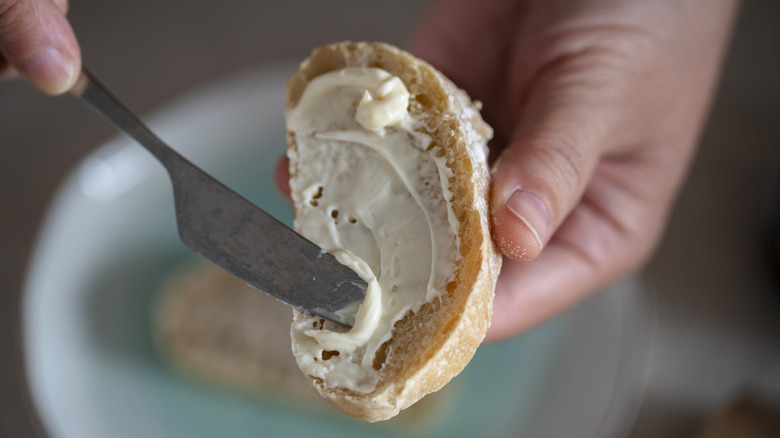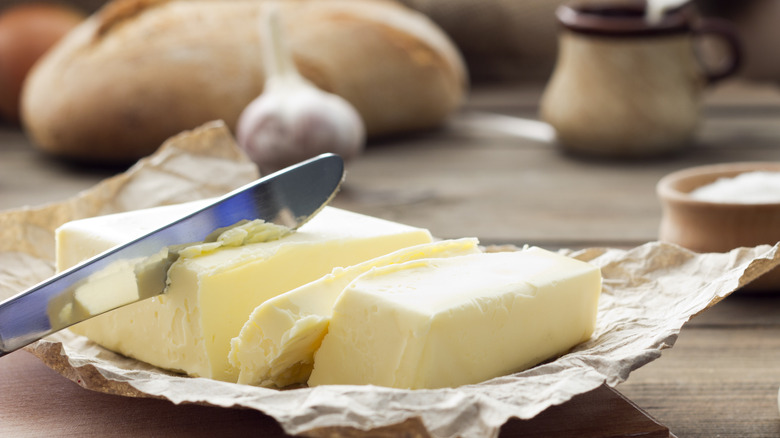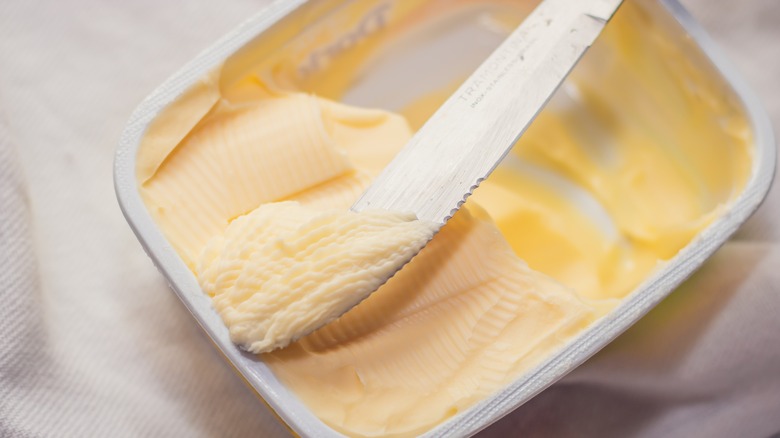Eating Butter Has An Unexpected Effect On Your Risk Of Cancer
If you're someone who regularly loads up on fruits, veggies, and other cancer-fighting foods, consider throwing some butter into the mix. As an immediate flavor enhancer, butter can take the taste of our favorite foods to the next level. Yet many of us have long been told to minimize consumption of this creamy complement due to its high saturated fat content. Emerging research from the 1950s, dubbed the diet-heart hypothesis, once suggested that consumption of saturated fat posed risks to our heart health (per Current Opinion in Endocrinology, Diabetes, and Obesity). For decades, this left many of us believing that butter was "bad" for us. More recent research has pushed back against this claim, however. When consumed mindfully, butter may actually benefit our health — particularly when it comes to cancer risk.
We have beta-carotene to thank for butter's potential cancer-fighting properties, reports WebMD. This dietary antioxidant helps prevent cell damage inflicted by harmful chemicals known as free radicals, according to the National Cancer Institute. Such damage has been linked to the development of cancer.
Butter contains beta-carotene
It's important to get plenty of beta-carotene from our diet, but supplements are another story. Experts at Mount Sinai report how some research has shown that beta-carotene supplements may oppositely increase one's risk for cancer, particularly lung cancer in people who smoke. One possible explanation for this connection is that dietary sources of beta-carotene tend to offer greater protection against cell damage than supplements.
Butter is just one of many dairy products, and the relationship between dairy consumption and cancer risk is still in need of further research. This is particularly true when it comes to different types of cancers. For example, WebMD states that the beta-carotene in butter may help lower one's risk of lung cancer or prostate cancer, but some experts say the opposite when it comes to dairy. "We have some evidence that shows a stronger correlation with dairy consumption and prostate cancer development," Dr. Meroë Morse of MD Anderson's Integrative Medicine Center tells MD Anderson Cancer Center. Dr. Morse adds that dairy may instead be more effective in protecting against breast and colorectal cancer.
The butter versus margarine debate
While butter may potentially offer some protection against certain types of cancer, can the same be said for margarine? This popular butter substitute has changed quite a bit over the years. In the past, margarine contained greater amounts of trans fats, reports Harvard Health Publishing. Trans fats have been linked with an increased risk of cardiovascular disease and hypercholesterolemia. Additionally, 2012 research published in the International Journal of Cancer found that the trans fat content in margarine was associated with an increased susceptibility to certain cancers, including lung, rectum, and breast cancer. Since then, many margarines have done away with trans fats and are instead high in unsaturated fats (healthy fats).
However, both butter and margarine are high in calories, which can pose health risks if eaten in excess. Experts at Hartford HealthCare instead recommend opting for butter sourced from grass-fed cows or choosing olive- or avocado-based spreads as these are richer sources of cancer-fighting beta-carotene. Just be sure to keep an eye out for any additives on the list of product ingredients.



